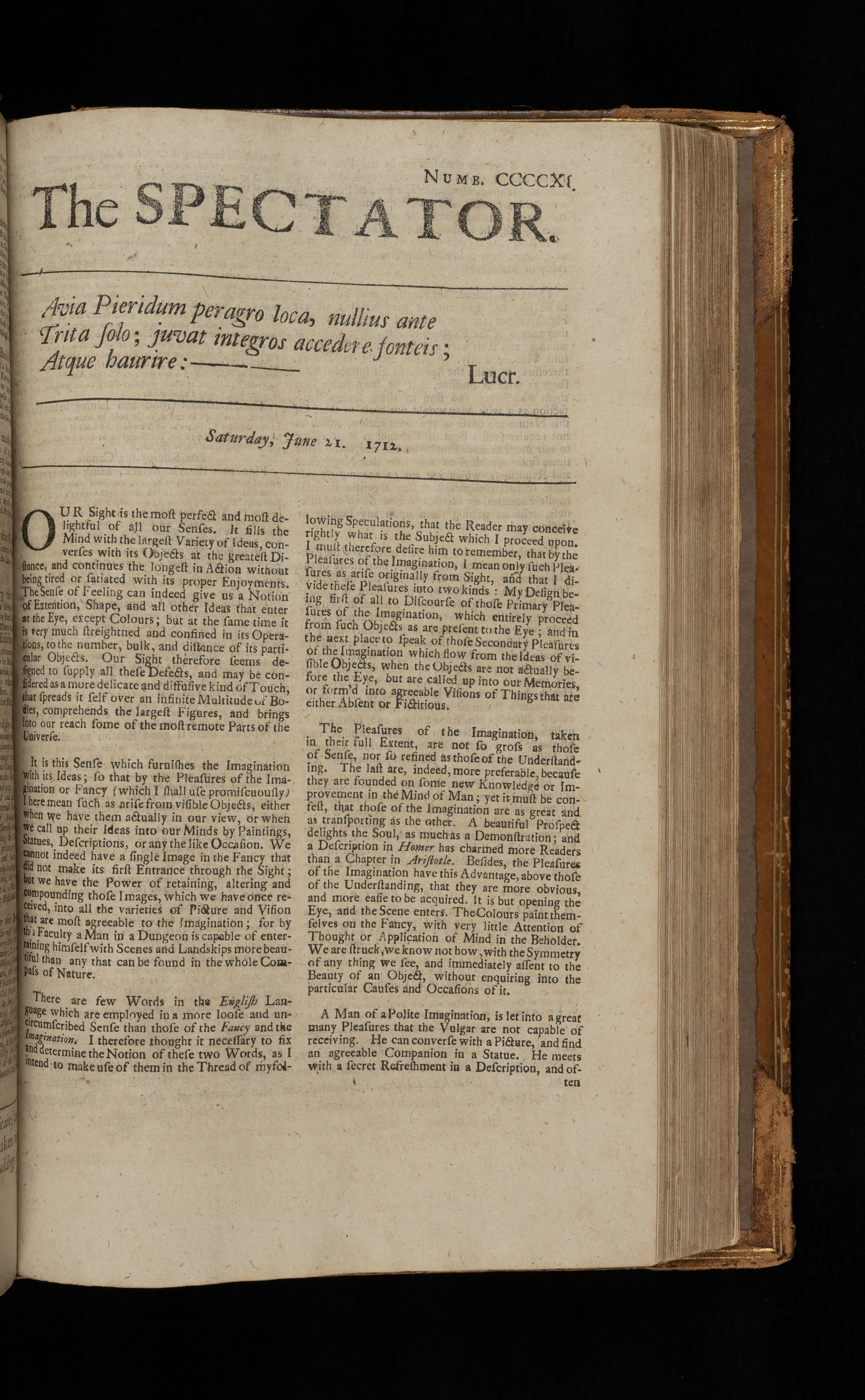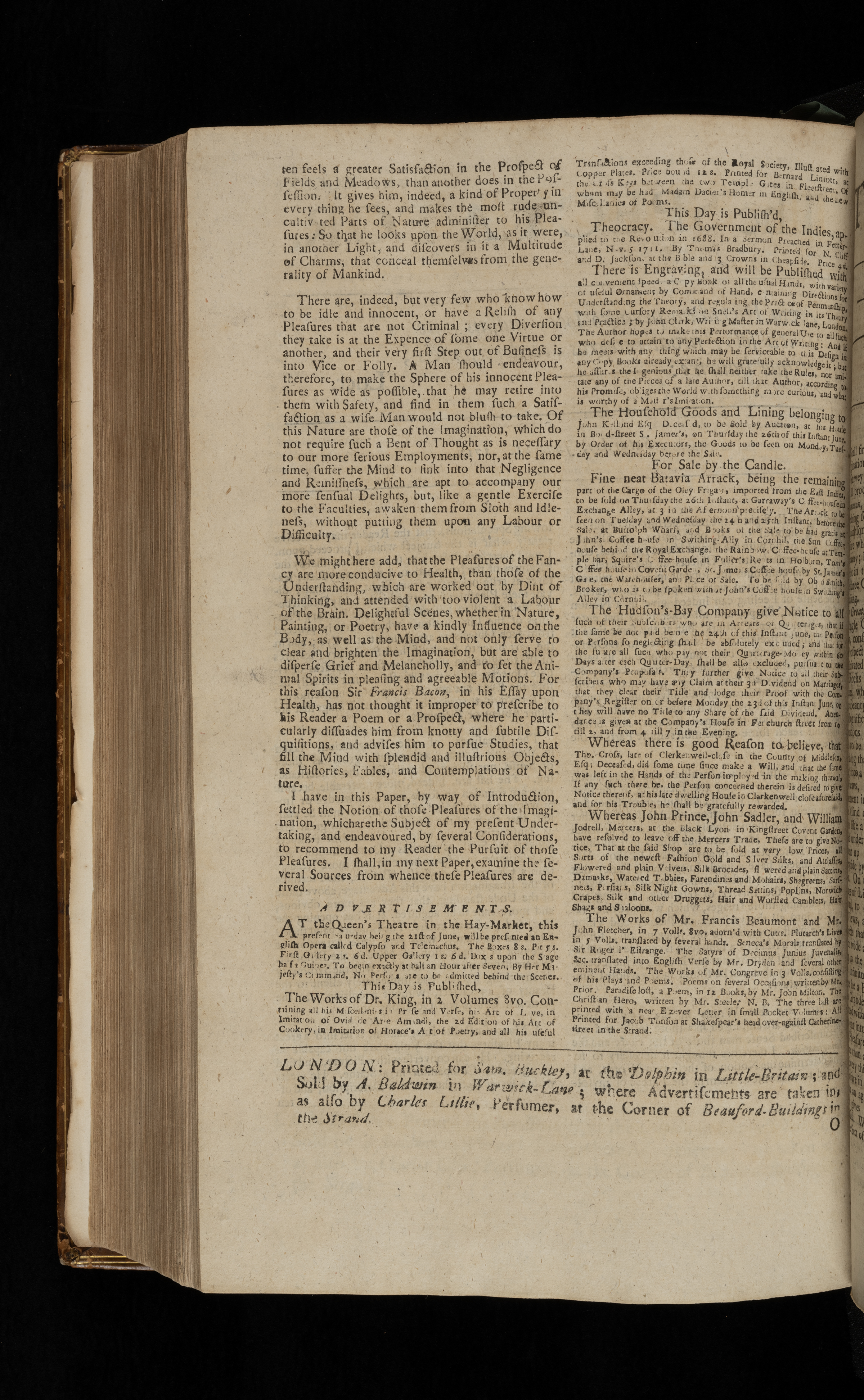The Spectator, Issue 411, Saturday, June 21, 1712
By
Joseph Addison
June 24, 1712
Avia Pieridum peragro loca, nullius ante
Trita solo; juvat integros accedere fonteis;
Atque haurire:—---------------Lucr.LucretiusLucretius"A pathless country of the Pierides I traverse, where no other foot has ever trod. I love to approach virgin springs, and there to drink." From Lucretius, De Rerum Natura.
Our Sight is the most perfect and most delightful of all our Senses. It fills the Mind with the largest Variety of Ideas, converses with its Objects at the greatest Distance, and continues the longest in Action without being tired or satiated with its proper Enjoyments. The Sense of Feeling can indeed give us a Notion of Extension, Shape, and all other Ideas that enter at the Eye, except Colours; but at the same time it is very much streightned and confined in its Operations, to the number, bulk, and distance of its particular Objects. Our Sight seems designed to supply all these Defects, and may be considered as a more delicate and diffusive kind of Touch, that spreads it self over an infinite Multitude of Bodies, comprehends the largest Figures, and brings into our reach some of the most remote Parts of the Universe.
It is this Sense which furnishes the Imagination with its Ideas; so that by the Pleasures of the Imagination or Fancy (which I shall use promiscuouslypromiscuouslypromiscuouslya great many times; over and over again I here mean such as arise from visible Objects, either when we have them actually in our View, or when we call up their Ideas in our Minds by Paintings, Statues, Descriptions, or any the like Occasion. We cannot indeed have a single Image in the Fancy that did not make its first Entrance through the Sight; but we have the Power of retaining, altering and compounding those Images, which we have once received, into all the varieties of Picture and Vision that are most agreeable to the Imagination; for by this Faculty a Man in a Dungeon is capable of entertaining himself with Scenes and Landskips more beautiful than any that can be found in the whole Compass of Nature.
There are few Words in the English Language which are employed in a more loose and uncircumscribed Sense than those of the Fancy and the Imagination. I therefore thought it necessary to fix and determine the Notion of these two Words, as I intend to make use of them in the Thread of my following Speculations, that the Reader may conceive rightly what is the Subject which I proceed upon. I must therefore desire him to remember, that by the Pleasures of the Imagination, I mean only such Pleasures as arise originally from Sight, and that I divide these Pleasures into two Kinds: My Design being first of all to Discourse of those Primary Pleasures of the Imagination, which entirely proceed from such Objects as are before our1 Eyes; and in the next place to speak of those Secondary Pleasures of the Imagination which flow from the Ideas of visible Objects, when the Objects are not actually before the Eye, but are called up into our Memories, or formed into agreeable Visions of Things that are either Absent or Fictitious.
The Pleasures of the Imagination, taken in the full Extent, are not so gross as those of Sense, nor so refined as those of the Understanding. The last are, indeed, more preferable, because they are founded on some new Knowledge or Improvement in the Mind of Man; yet it must be confest, that those of the Imagination are as great and as transporting as the other. A beautiful Prospect delights the Soul, as much as a Demonstration; and a Description in Homer has charmed more Readers than a Chapter in Aristotle. Besides, the Pleasures of the Imagination have this Advantage, above those of the Understanding, that they are more obvious, and more easie to be acquired. It is but opening the Eye, and the Scene enters. The Colours paint themselves on the Fancy, with very little Attention of Thought or Application of Mind in the Beholder. We are struck, we know not how, with the Symmetry of any thing we see, and immediately assent to the Beauty of an Object, without enquiring into the particular Causes and Occasions of it.
A Man of a Polite Imagination is let into a great many Pleasures, that the Vulgar are not capable of receiving. He can converse with a Picture, and find an agreeable Companion in a Statue. He meets with a secret Refreshment in a Description, and of

